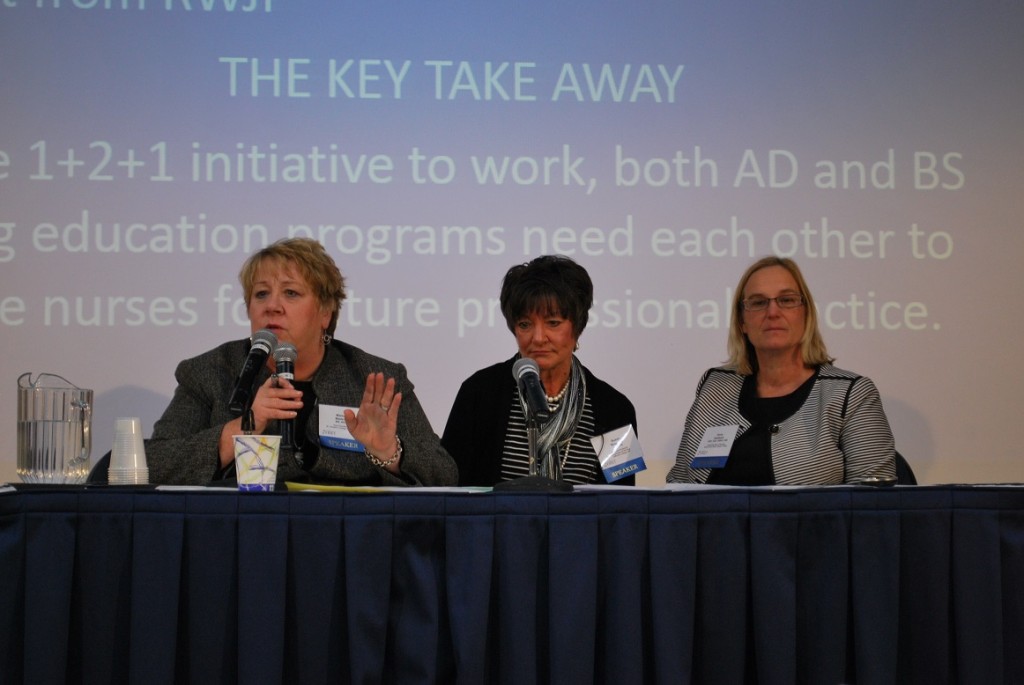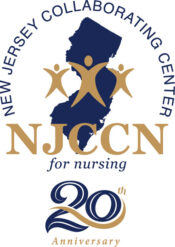In this Issue:
New Jersey Summit Hits High Points in Academic Progression Journey
NJNI Begins New Pilot Project With Planning Grants
Alumni and Scholars Update
Did You Know…?
New Jersey Summit Hits High Points in Academic Progression Journey
Action Coalition Highlights Importance of Alliances with NJNI and others.

Speakers at the New Jersey Action Coalition Seamless Academic Progression Summit II included, from left, Marianne Markowitz, MS, RN, CNE, vice president and dean of St. Joseph’s College of Nursing, and Susan Bastable, EdD, RN, nursing department chair and professor at Le Moyne College, both in New York state, and Ann Hubbard, DNP, EdD, ARNP, CNE, associate dean of nursing at Indian River State College in Florida.
The New Jersey Action Coalition (NJAC) Seamless Academic Progression Summit II drew more than 60 attendees to hear local and national perspectives on advancing education transformation, a key recommendation in the landmark Institute of Medicine (IOM) report The Future of Nursing: Leading Change, Advancing Health.
After NJAC Co-Lead Edna Cadmus, PhD, RN, NEA-BC, FAAN, welcomed the crowd assembled at the New Jersey Hospital Association in Princeton in late November, she introduced Pat Polansky, RN, MS, co-director of the Center to Champion Nursing in America, an initiative of AARP, the AARP Foundation, and the Robert Wood Johnson Foundation (RWJF) that serves as national headquarters for the Future of Nursing: Campaign for Action. The Campaign is working to implement the IOM’s future of nursing recommendations through Action Coalitions it has created in all 50 states and the District of Columbia, and at the national level.
Polansky challenged attendees to view health care’s rapid evolution as a “race” that nurses must embrace. “If nurses don’t elevate and integrate,” she said, “we will remain mid-level providers.”
New Jersey Nursing Initiative (NJNI) Program Co-Director Susan Salmond, EdD, RN, ANEF, FAAN, executive vice dean and professor at the Rutgers School of Nursing, and Maria LoGrippo, PhD, RN, MSN, NE-BC, a New Jersey Nursing Scholar alumna and project director for NJAC’s academic-progression-focused State Implementation Program grant from RWJF, reported on NJAC’s Academic Progression Pilot Project.
“Education in New Jersey has a history of being siloed,” Salmond observed. “The changes we’re experiencing are very exciting—realizing that we’ve had to come out of our silos and work together. It’s fantastic to see the commitment to collegiality and collaboration in the state now.”
As the project shifts its focus from gap analysis to model design, LoGrippo said, priorities include alliances such as working with RWJF’s New Jersey Health Initiatives and NJNI programs; optimizing in-kind support from the New Jersey Hospital Association; providing “navigators” who will promote seamless academic progression models to both associate degree RNs and non-nurses in practice settings who are interested in pursuing bachelor of science in nursing (BSN) degrees; increasing diversity among aspiring nurses; and developing an online tool that provides guidance for students on nursing education and financial aid.
“We may not have consensus on one model in New Jersey,” LoGrippo added, “but we want there to be transparency about the models that do work.”
Mary Baroni, PhD, RN, professor of nursing and health studies at the University of Washington, Bothell, highlighted efforts to enhance curricular alignment between two- and four-year institutions and streamline a statewide associate degree in nursing (ADN)-to-BSN curricular pathway.
Sharon Gavin Fought, PhD, RN, director and associate professor of nursing at the University of Washington, Tacoma, and Gerianne Babbo, RN, MN, professor and associate dean for nursing at Olympic College, a two-year institution, shared their process for building an RN-to-BSN partnership. A crucial aspect, Fought said, was committing “to a new level of communication and trust. We had a lot of conversations that we were building on the ADN program, not replacing it. Now we don’t hear that concern anymore.”
Ann Hubbard, DNP, EdD, ARNP, CNE, associate dean of nursing at Indian River State College in Florida, discussed her institution’s successful online RN-to-BSN program, while Susan Bastable, EdD, RN, nursing department chair and professor at Le Moyne College, and Marianne Markowitz, MS, RN, CNE, vice president and dean of St. Joseph’s College of Nursing, talked about their efforts in New York state to establish a Dual Degree Partnership in Nursing.
“This model would not work without both partners,” Bastable said. “They can’t do it alone. One or the other is not going to disappear.”
“We can’t emphasize the importance of practice partners enough,” Markowitz added. “They’re crucial for clinical placements, and it’s important for them to recognize the value of these students.”
The summit also devoted time to a panel on workforce needs in acute care, home health nursing, and long-term care.
Magnet hospitals have been a driving force in increasing the number of nurses with BSNs, said panelist Robyn Begley, DNP, RN, NEA-BC, vice president of nursing and chief nursing officer for AtlantiCare Regional Medical Center. She added that with health care shifting away from acute care settings, “we are looking at innovative approaches across the continuum—hospice, telehealth, palliative care and more.”
NJNI Begins New Pilot Project With Planning Grants
Three nursing programs have been chosen to receive New Jersey Nursing Initiative (NJNI) Redesigning Nursing Education to Address the Challenges and Opportunities and Population Health Planning Grant Awards. Each grantee will receive $50,000 to plan a pilot project that brings academic and practice partners together on innovative curricular issues.
The grant recipients are:
- The College of New Jersey, Using an Academic-Practice Partnership to Enhance Population-Focused Health Care in BSN Education: Planning for the Future;
- Rutgers (Newark/New Brunswick), Redesigning Nursing Education to Address the Challenges and Opportunities of Elder Population Health; and
- Rutgers (Camden), Redesigning Nursing Education to Address the Challenges and Opportunities for Population Health.
These grantees will be considered for implementation grants for the 2015-16 academic year.
NJNI had a successful experience with earlier Innovations in Clinical Education pilot projects. This latest effort reflects NJNI’s shift from faculty preparation to faculty development, and its enhanced focus on encouraging nursing educators in the Garden State to transition curricula and clinical experience in order to help prepare nurses to meet the emerging demands of community-based care and population health.
Alumni and Scholars Update
- New Jersey Nursing Scholar alumna Maria LoGrippo, PhD, RN, MSN, NE-BC, was one of 10 recipients of the new Breakthrough Leaders in Nursing award created by the Future of Nursing: Campaign for Action, a joint initiative of AARP and the Robert Wood Johnson Foundation (RWJF). The award celebrates nurse leadership and the importance of efforts by nurses to improve health and health care.
LoGrippo, who teaches nursing at Rutgers and Seton Hall University and serves as project director for the New Jersey Action Coalition’s academic-progression-focused State Implementation Program grant from RWJF, and her fellow award recipients were recognized during the Campaign for Action Summit in November in Phoenix.
- Lisa Heelan, MSN, FNP-BC, ANP-BC, who is pursuing her PhD at Seton Hall University as a New Jersey Nursing Scholar, has given several presentations since the current academic year began. Her poster abstract, “Patient Advocacy: The Role of Research and Power to Participate Knowingly in Change,” was selected by Seton Hall for the Rising Stars in Nursing invited poster program at Sigma Theta Tau International’s Leadership Connection event, which was held in September in Indianapolis.
Also, Heelan’s abstract for the oral presentation “Human Dignity and Power in Childbirth” and her poster presentation “Human Dignity and Patient Advocacy as Mutual Process” were accepted by the Rogerian Society for a conference held in October in Knoxville, Tenn.
If you are a New Jersey Nursing Scholar alumna or alumnus, or a current Scholar, please let NJNI know what’s new with you, so you can be featured in the next Alumni and Scholars Update section of the newsletter. Send your news about new jobs, research progress, publications, and more to info@njni.org.
Did You Know…?
- The next Collaborative Learning Community (CLC) event is the February 12 webinar, Ongoing Professional Development: How to Bring Value to Your Organization, Community and Profession. The webinar will provide guidance on self-presentation and self-marketing, building a professional portfolio, effectively presenting that portfolio to various audiences, networking to build a career, building leadership skills, and more. It is intended to help Scholars prepare for their careers as leaders in nursing, research and academia.
- A CLC graduation event will be part of the New Jersey Nursing Initiative Annual Meeting on April 9 and 10. Stay tuned for additional details.
- The New Jersey Nursing Initiative (NJNI) is active on social media, and wants to connect with you! Be sure to follow @NJNIprogram on Twitter, and keep up with NJNI on Facebook at www.facebook.com/NewJerseyNursingInitiative.
